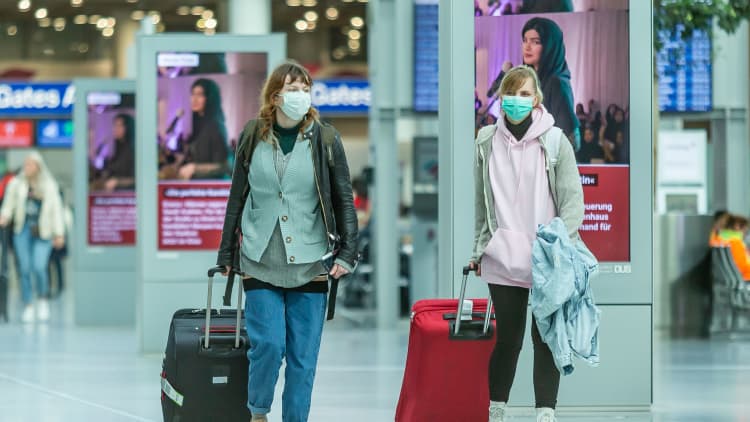Many people thought Regina Phelps, a crisis management consultant, was "crazy" when she added pandemic planning to her company's list of services in the late 1990s.
"Then in 2006, when the avian influenza [H5N1 outbreak] really picked up, it was like, 'oh, my gosh, they're so brilliant,'" Phelps tells CNBC Make It. (The so-called bird flu infected at least 800 people from 2003 to 2015, and has about a 60% death rate, according to the World Health Organization.)
Today, Phelps' phone is ringing off the hook as companies across the country (and world) are adjusting to the coronavirus pandemic that has claimed more than 7,100 lives globally.
"I get up every morning at between 3 to 3:30 a.m. and I've been on calls from 4 a.m. till now," she says.
Phelps is the founder of Emergency Management & Safety Solutions in San Francisco, where she advises companies like Whole Foods, Nike and Starbucks on crisis management plans, including possible pandemics.
Many companies have already curbed travel and asked non-essential employees to work from home. Here are four things Phelps advises that every business needs to do now for its employees, and to keep things under control.
Know who's sick
First, companies need to know what is going on with their employees/vendors.
"The key thing is, are there any illnesses?" Phelps says.
Managers should be continuously checking in with their employees even while they are working from home to see if they have any symptoms brewing or have gotten sick since leaving the office.
"If someone has COVID-19, you cannot say who the person is [because] of HIPA. [But] you need to however interview the employee to determine who they had contact with and then interview those people and send them home for 14 days," Phelps says.
Re-adjust workplace environments
What's more, if employees are not able to work from home, companies need to re-adjust workplaces for social distancing.
"So, we're talking about [being] six feet apart," Phelps says, "No handshaking and no face-to-face meetings."
Desks will likely need to be moved and areas that people touch need to be cleaned multiple times a day.
"Increased cleaning of all high touched surfaces is a bigger issue in jobs that have equipment or machines they work with," Phelps says.
Also, companies need to close all break rooms and cafeterias. Employees will now need to eat spread out at least six feet apart.
Deploy support services
Companies should be deploying all of their Employee Assistance Program services to provide emotional support and counseling for employees.
"Many are going to be extremely uncomfortable because for them this just happened overnight," Phelps says.
In her experience, many people become frightened in chaotic times like this and feel very alone. So it is important for companies to make their employees feel supported at and outside of work.
Watch out for scammers
The bad guys like to come out in difficult times like this, Phelps says.
"There is a huge plethora of cyber attacks going on right now through really targeted phishing emails that are preying on people's fears," Phelps says.
She urges companies and consumers alike to look out for really well-done articles that say "click here, if you need to buy masks or hand sanitizer."
"They often look like they are from super legitimate companies too," she says, urging companies to upgrade their security measures during a pandemic and inform employees to be on the alert if they see anything suspicious. Employees should follow your company's guidelines around phishing attacks.
Check out: The best credit cards of 2020 could earn you over $1,000 in 5 years
Don't miss:
Coronavirus stockpiling: Don't waste your money on these items, according to a pandemic planner
CDC says Americans need to prepare for coronavirus now — here's what you can do



